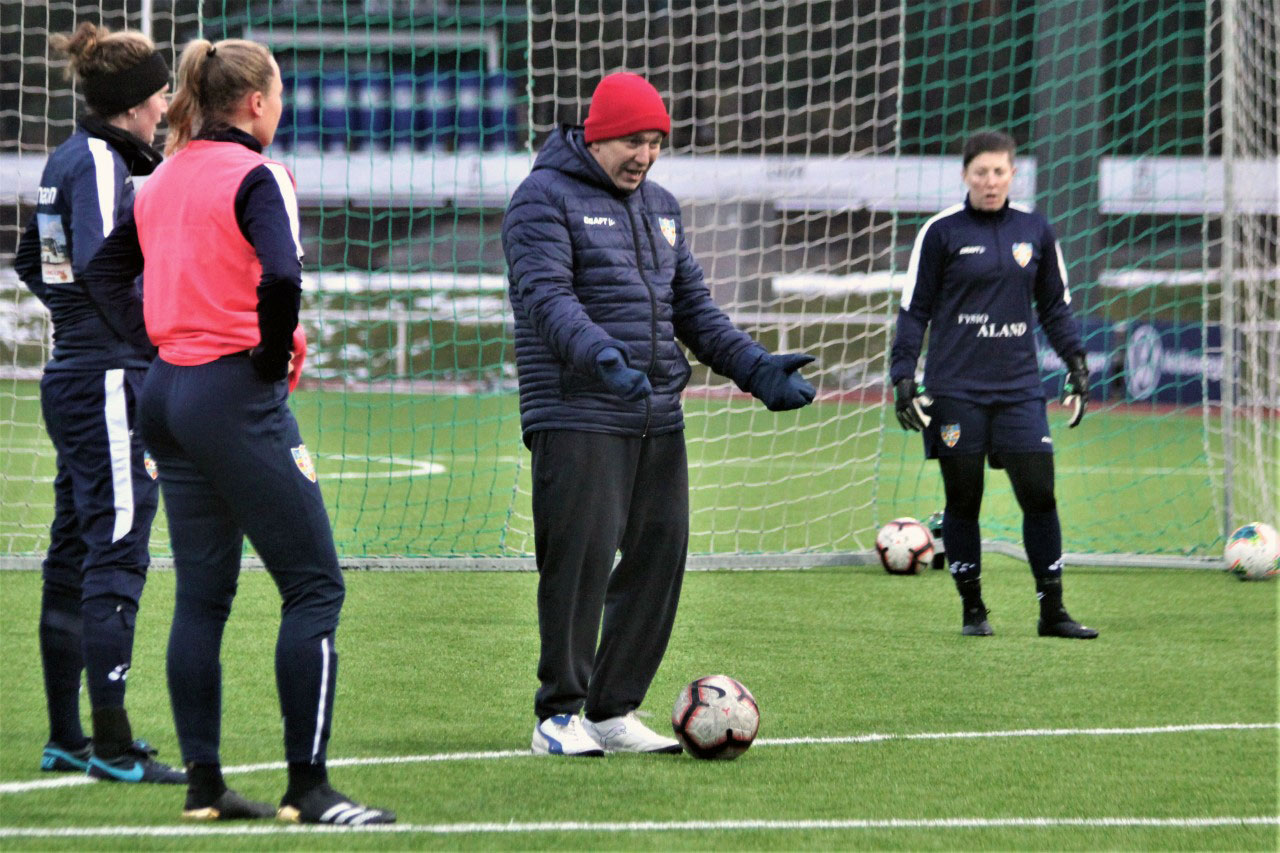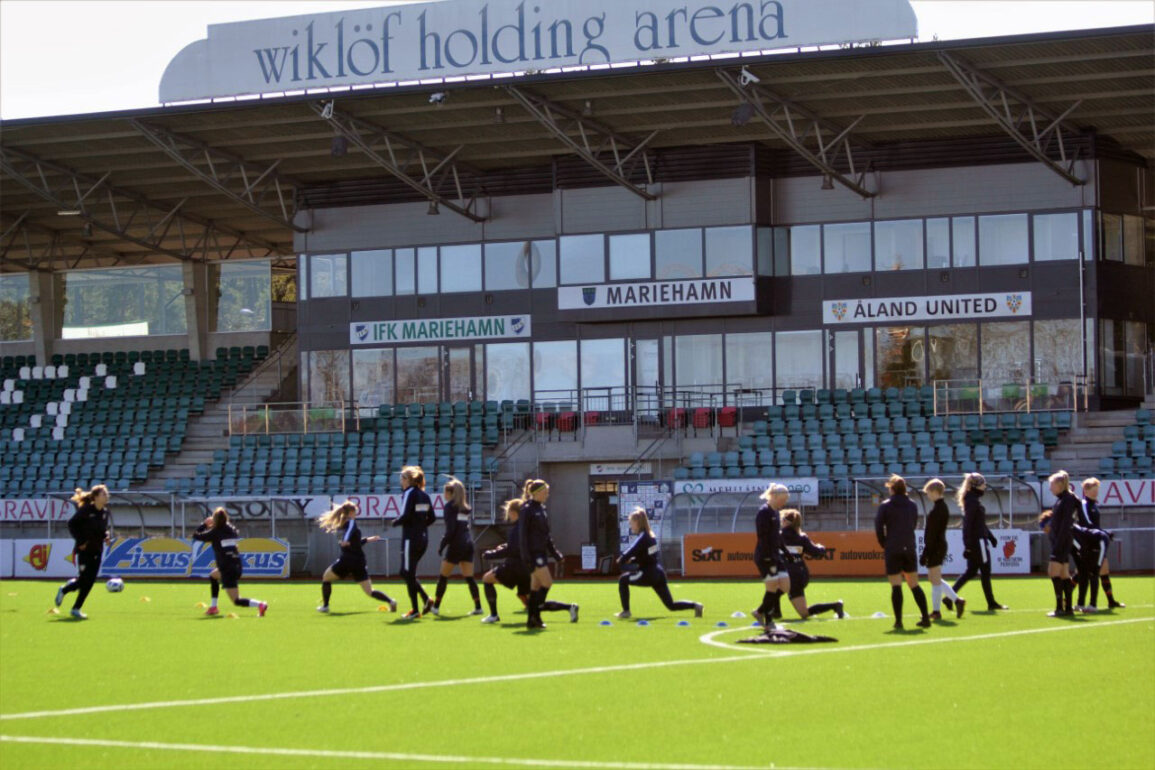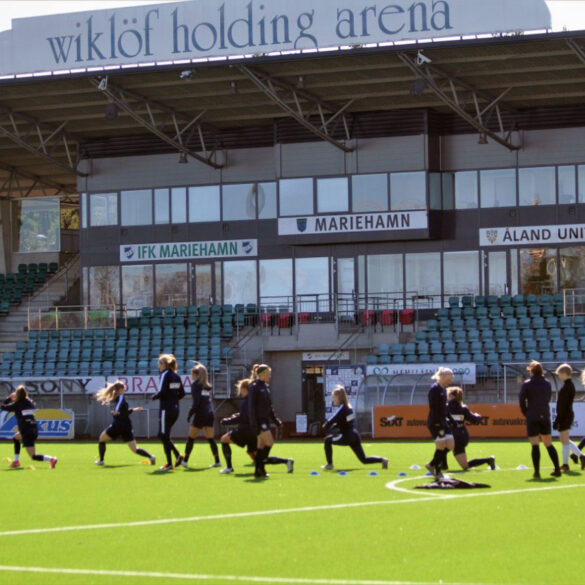Åland is the smallest region of Finland, making up just half a percent of the overall population. That, though, doesn’t even tell half the story of what Åland is and has become.
An archipelago of more than 6,000 islands — of which only 60 of them are inhabited — the region is autonomous, governed by itself, but the President of Finland is also the President of Åland, though the official language is Swedish.
It’s main island, unofficially named Fasta, the farthest west and closer to Sweden than it is Finland, plays home to 90% of Åland’s 30,000 inhabitants, with the region having what is described as a “complicated” relationship with Finland.
It has everything a mainland city would have within its capital city of Mariehamn: museums, a bus station, a post office, schools. It also has a women’s football team that plays in Finland’s Kansallinen Liiga, the top division in women’s soccer. It’s not just any old football team either but the best Finland currently has to offer — Åland United current league title holders.
The team was created less than 20 years ago when then Åland-based clubs Lemlands IF and IF Finströms combined their resources to form one club. Four years later, remaining clubs Saltviks IF, IFK Mariehamn, and Sunds IF joined to make one super club based on the island.
By the time that came around in 2005, Åland had been promoted to the then Naisten Liiga, Finland’s top division, just 12 months after its creation. In 2009, the club won the league title for the first time, forging them an incredible path to the Champions League.
A 15–0 aggregate defeat to then giants Turbine Potsdam emphasized the gap, but Åland won the domestic title again in 2013 before dropping into a mid-table malaise for several seasons, in addition to several more seasons of near misses.
Long-standing staff member Mikael Virta joined in 2009 as an assistant coach just as league title number one was on the horizon and has never left, taking on a sporting director role in 2015 and juggling the job with being a full-time teacher on the island.
“I’m trying to teach and buy players at the same time,” he laughed when we spoke in March, just ahead of the new league season as the club tries to defend its 2020 title won under former head coach, Samuel Fagerholm.
Fagerholm was born on the island and played for Åland in the Island Games as a youngster, a competition for autonomous regions not affiliated with FIFA. When he became manager in 2018 he was given a three-year project that included rebuilding the team and winning the league, the latter of which he achieved at the end of his third and final year.
“It should be impossible,” declared Virta, when reflecting on a third league title won against much bigger sides with larger resources and based on the mainland.
It hasn’t been an easy journey either as Virta lays bare the challenges the club has faced over the years in search of becoming a sustainable club.
“Back at the start, it was hand to mouth, we were surviving by the day,” he recalled. “Our coach at the time wanted more players from the mainland, which we did, we dominated the league in 2009 and that was a surprise to everyone.
“The mission was to make us a ‘big’ club and I can look back now and say it was stupid, because we are a small club on an island. We’d won the league and we spent a lot of money to get in players, but the foundation wasn’t there, we almost went bankrupt in 2011. Local authorities gave us some funding, they saved us, but we had to save ourselves by being more responsible and since then we have always had a responsible budget.”
Challenges
Even with sustainability and more success, there are endless challenges to being a team based on an island, whether autonomous or not.
Fagerholm led his hometown side to glory in 2020 and that success will see Åland United enter the new-look Champions League for a third time in August 2021. Fagerholm left the club to sign a deal with Swedish giants Umeå IK, which he took over at the start of the year.
But not only did they lose their coach they also lost a huge chunk of their title-winning squad. Top scorer South African Ode Fulutudilu went to Glasgow City, while their second and third top scorers also departed: Spaniard Rosita to Umeå along with Fagerholm and Swede Emelie Johansson to Norrköping.
Anna Tamminen, Isabella Mattson, Tilde Hellund, Ashley Reifner, Olivia Mattsson, Cornelia Sundelius, Shannon Simon, Tiia Paltonen, and Rebecca Bjorkvall also all left, with the latter retiring and the rest joining either clubs in mainland Finland, Sweden, or Denmark.
“We are on an island, players come here and see it as an adventure. They come for a year and then leave, but we need to keep players for longer,” said Virta.
“We need to be here for the local players, they don’t have to move away, but there aren’t that many local players. We sell it to the Finnish players that would we could be their key to going abroad as we are geographically closer to Sweden, which is a bigger league.
“We have had Americans who come straight from college, they see it as an opportunity. Last year was a happy ending for many of them, we lost many and we have been forced to replace them. We have a small squad, we have replaced most but we still need a couple more, we just don’t have the money to have a big squad.”
Only a handful of players are full-time, many others work other jobs on the island. Foreign imports are housed together in Mariehamn, while others are still young enough to be in full-time education.
“The rise of women’s football is a great, great thing, but also puts small clubs like us in very difficult situations, because we know our money isn’t enough, yet we still managed to win the league and the cup — those things are almost impossible to do.”
The first thing Virta had to do was find a new head coach, turning to English manager Steve Beeks, a former non-league player and manager and who has lived and worked in Åland for many years, first coaching the Åland United women’s team 10 years ago before joining the island’s main men’s team, IFK Mariehamn, as an academy director.

New Again
Beeks’ journey to Åland wasn’t intentional, but it has become his home, the place he met his wife, the place he has raised his children, and the place which will now see him coach in Europe’s premier club competition later this year.
“I was playing for Staines Town and the secretary was a big football nut, he followed this tournament called the Island Games,” said Beeks. “It’s like a mini Olympics. Jersey, Guernsey, Menorca et cetera — and Åland.
“He used to go and watch this tournament and he got to know the Åland coach at the time and he asked me to bring my soccer school team to Åland for a youth tournament. There were about 150 teams of Under-11 boys, this was back in 1994 and we ended up bringing a team every year until about 2014. We went every year for nearly two decades and naturally I got to know a lot of people.”
Beeks lived with his wife in England until 2010, coaching a variety of local non-league sides, and almost ended up taking a job in the UAE managing Al-Fujairah, but the move fell through before Åland once again pulled him back to Scandinavia.
He coached the women’s team in 2011 and 2012 before being asked to go and run the academy at IFK Mariehamn, a role he kept until Åland United wanted him back for a second spell at the start of this year.
“Samuel was a friend of mine and played for me when he was younger,” Beeks recalled. “When he left, he asked me to take over. To coach in the Champions League is quite exciting. I was ready for a change again and it suited me well to come back.
“I’ve lived here for 10 years now. Some people are very Finnish, some people would rather be part of Sweden and some would rather just be Ålanders. Swedish, though, is quite prominent; we speak Swedish on the island.”
When we spoke in March, Beeks is in the process of finalizing his new-look squad for the 2021 season, as well as the latter stages of the cup, with a quarterfinal against PK-35 Helsinki coming up.
His recruitment has led to signing USA-born goalkeeper Christina Dineson, as well as Sanni Ojanen, new star striker Cassandra Korhonen from Uppsala in Sweden, Matilda Nurmi, two more U.S. players in Karen Reyes, straight out of college, and technical midfielder Sarah Triccoli from Racing Santander in Spain.
The couple more signings Virta referenced eventually arrive shortly after we spoke in the form of Portuguese duo Mariana Jaleca, plus Catarina Ferreira from domestic champions Benfica.
“A lot of the players decided they were leaving, but fortunately I convinced a couple to stay,” said Beeks. “Building a new squad has been difficult. I wasn’t worried given my connections back home, but now with Brexit and COVID-19, it’s been hard to get visas and just as hard to actually get players into the country.”
Travel Daze
Ahead of the new season, it is not just recruitment that is a hurdle in the way of finally defending a league title, but also the logistics of being an island team cut off from mainland Finland when every other side is a ferry or a flight away.
“We have to use the ferry for away games, but COVID-19 has even made that a problem” admitted Virta. “If we have a game in Helsinki, we jump on a ferry in Mariehamn at midnight and arrive at 10am. We play the game, then come back on the evening ferry and get back to Mariehamn at about 2:30 a.m., so a normal away trip for us takes 26 hours!
“Now, the Helsinki ferry isn’t running, so every game we fly the day before and stay over, so the ‘short’ away trip has now become 48 hours. But, Ålanders are used to traveling and it means we don’t need to organize specific team-bonding days because every game is a trip away with everyone and I think that’s been a strength for us that maybe people on the outside don’t see.”
While there may be logistical issues, Beeks can’t complain about what he, his staff, and his players have access to when back home preparing for big league and cup games that lie ahead.
They train on the main stadium pitch that they share with IFK Mariehamn, a stadium that has taken pride of place just between the two shores since 1932 — the Wiklof Holding Arena.
Refurbished in 2015, it has a brand-new 5G surface and Åland plays all their games there, as well as hosting all their training sessions there too.
“On a Monday we do individual sessions which the players can choose if they want to do that and choose what they want to work on,” said Beeks of his weekly schedule.
“Then, we have a team session every day from Tuesday to Friday. I’m at every session, my assistant is there, but he has a full-time job and our strength and conditioning coach is there twice a week. All the players get free gym membership, so they can work on things themselves too.”
With three league titles across 12 years, they may not seem like minnows, but everything about Åland screams they are. They have produced some exciting players over the years, including Adelina Engman who went on to play for Chelsea.
The season has started better than perhaps expected given the turnover of players and staff. They sit five points behind leaders KuPS, though it could have been less after a 1–1 draw with the leaders on Sunday, where Åland led until being pegged back in the 82nd minute.
The cup run Beeks was so worried about too has been superb and they will have the chance to defend their trophy in October’s final after a 3–0 win over PK-35 Helsinki in the quarterfinals and a thrilling 4–3 semifinal against KuPS a few weeks ago.
New signing Korhonen already has seven league goals, while Portuguese midfielder Jaleca has three, showing Beeks and Virta’s recruitment from far and wide is paying off handsomely.
Their most experienced player, Anna Westerlund, became Finland’s most capped player in April when making her 131st appearance, while the club has been granted a UEFA license to take part in the Champions League from August, although even that scheduling causes Beeks headaches.
“We qualified in October, but we don’t play in it until the following August, so almost all of our squad has changed by then. Finland hasn’t always done so well in Europe because generally the winning team loses some of its best players to bigger clubs and nations.
“Last year our champions lost 3–0 to an Iceland team, it’s disappointing for us if a Finnish team loses 3–0 to an Icelandic team. We’d like to flip that now for sure.”
Åland, though, has given Beeks a home. Among its challenges, it’s peaceful aura, small population, and calming nature has made it the perfect place for a man used to the hustle and bustle of London life to house his family and his career.
“Outside my house there’s an AstroTurf pitch about 50 metres away,” he said. “A few weeks ago, the fire brigade came along and just covered it in water to turn it into an ice rink, literally outside our house.
“A month ago, we were going skiing every weekend, it’s an outdoors life, even in winter. But the people are great, the lifestyle is great. I never lock my front door, my key to my car is always in the car. It’s safe, chilled, it’s a laid-back kind of place, and that’s just great for kids and families, it’s our home.”


